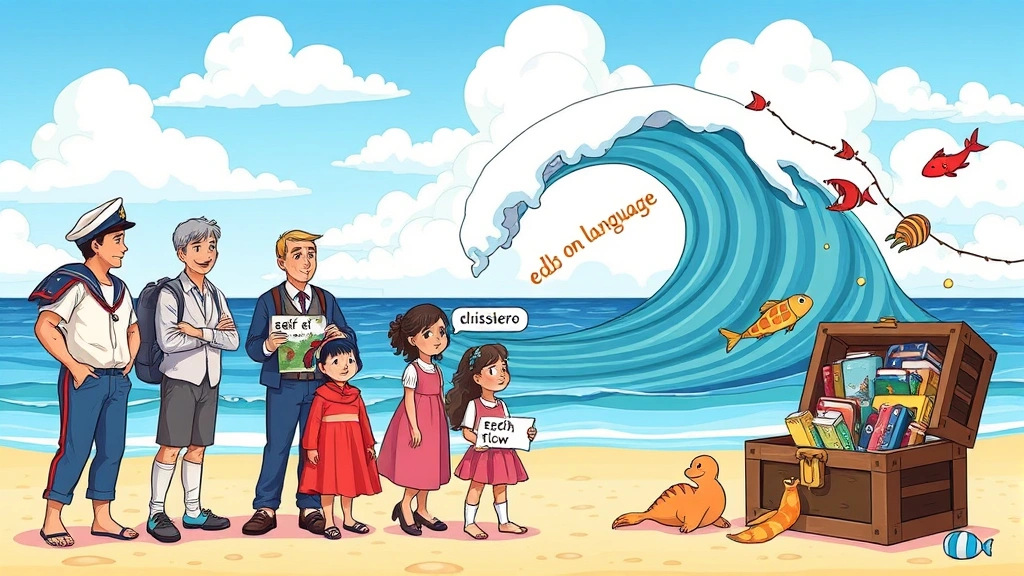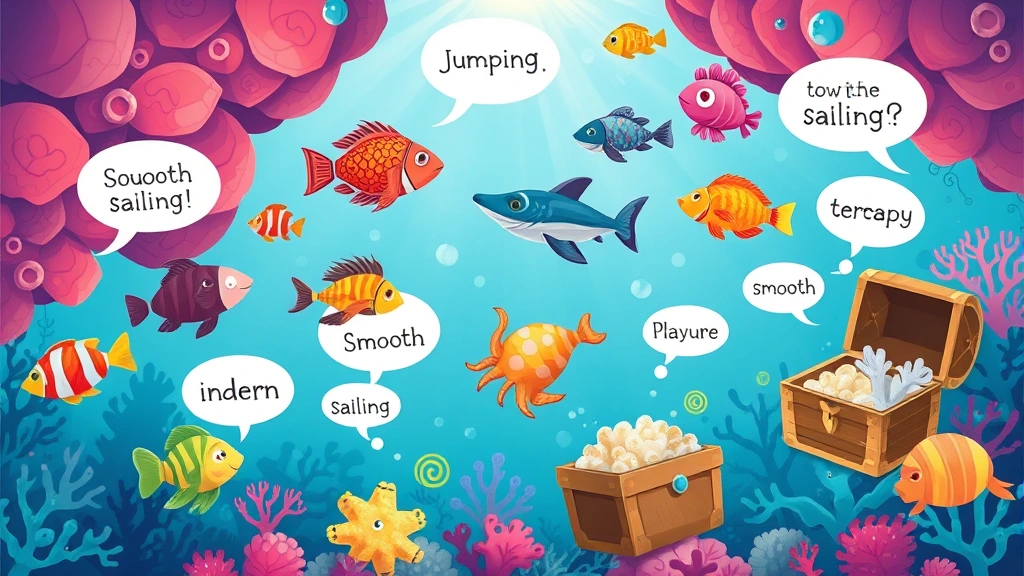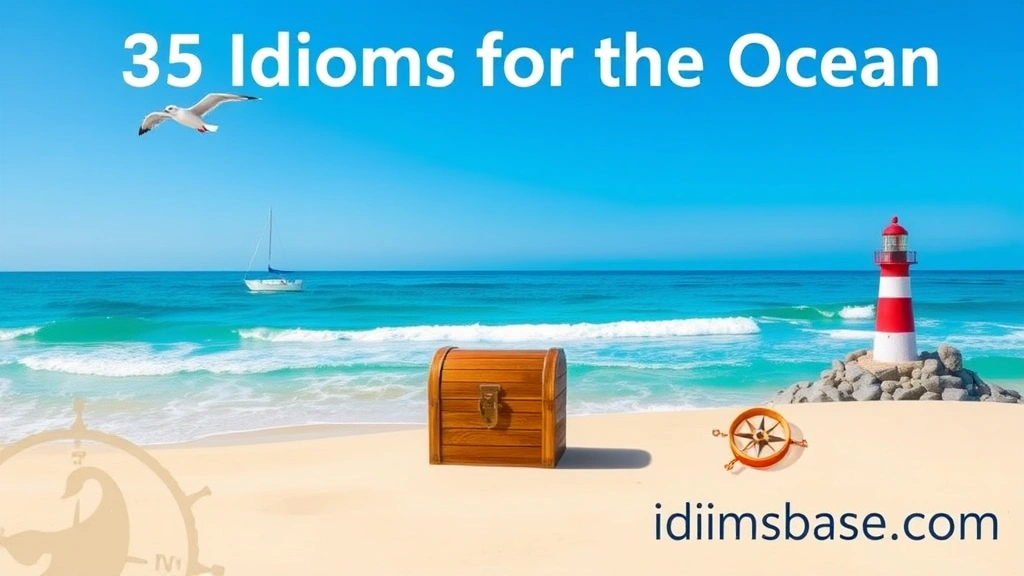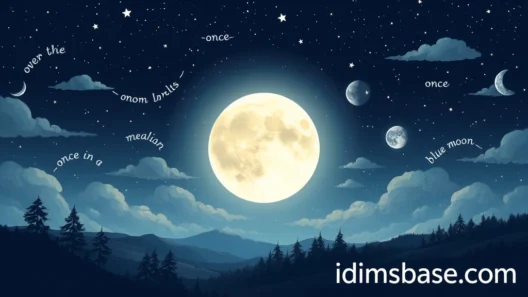Dive deep into the fascinating world of language with us! Have you ever noticed how many of our everyday expressions are inspired by the vast, mysterious, and powerful ocean? It's truly amazing how the ebb and flow of the tides, the depths of the sea, and the creatures within have shaped the way we speak. Whether you’re a seasoned sailor of semantics or just dipping your toes into English idioms, you’re in for a treat. Get ready to explore 35 incredible ocean-themed idioms that will not only enrich your vocabulary but also give you a fresh perspective on the beauty of the English language. So, hoist the sails and let’s set off on this linguistic adventure!
35 Ocean-Inspired Idioms You Need to Know
Let's navigate through these wonderful expressions, uncovering their meanings and how you can use them to add a splash of color to your conversations!
Idioms About Depth and Mystery
These idioms often refer to things hidden, profound, or difficult to understand.
- A drop in the ocean: Something very small and insignificant compared to the much larger thing it is part of.
- Example: "My small donation felt like a drop in the ocean compared to the massive flood relief effort needed."
- The tip of the iceberg: Only a small, visible part of a much larger, hidden problem or situation.
- Example: "The problems we've seen so far are just the tip of the iceberg; there's much more going on behind the scenes."
- To be out of your depth: To be in a situation that is too difficult for you to handle.
- Example: "When they started discussing quantum physics, I felt completely out of my depth."
- To plumb the depths: To explore something thoroughly and deeply, often to understand its true nature.
- Example: "The detective had to plumb the depths of human psychology to solve the complex case."
- There are plenty of fish in the sea: A comforting phrase used to tell someone who has broken up with a partner that there are many other potential partners.
- Example: "Don't worry about one failed relationship; there are plenty of fish in the sea!"
- To make waves: To cause a disturbance or create a significant impact, often in a controversial way.
- Example: "Her innovative marketing ideas really started to make waves in the industry."
- To be in deep water: To be in serious trouble or difficulty.
- Example: "After missing so many deadlines, he realized he was in deep water with his boss."
Idioms About Smooth Sailing and Rough Seas
These expressions often describe easy or difficult situations, much like a calm or stormy ocean.
- To sail through something: To complete something easily and successfully.
- Example: "She studied so hard that she sailed through her final exams."
- To weather the storm: To survive a difficult period or crisis.
- Example: "The company managed to weather the storm during the economic recession."
- Any port in a storm: Any solution or refuge is welcome in a time of crisis, even if it's not ideal.
- Example: "I didn't really want to stay at that hotel, but it was any port in a storm after our flight was cancelled."
- To be smooth sailing: To be easy and without problems.
- Example: "Once we finished the initial setup, the project was smooth sailing."
- To rock the boat: To do or say something that upsets an existing situation and causes problems.
- Example: "I don't want to rock the boat by asking for another raise so soon."
- To be adrift: To be without direction or purpose, often in a difficult situation.
- Example: "After losing his job, he felt completely adrift."
- To ebb and flow: To fluctuate or vary in a cyclical pattern.
- Example: "The popularity of certain fashion trends tends to ebb and flow over time."
- To go with the flow: To adapt to circumstances rather than resisting them.
- Example: "It's often easier to just go with the flow when you're traveling in a new country."
- To be all at sea: To be confused or bewildered.
- Example: "After the complex explanation, I was completely all at sea."
- To be on the rocks: To be experiencing serious problems and likely to fail (often used for relationships or businesses).
- Example: "Their marriage has been on the rocks for months."

Idioms About Waves and Tides
These idioms often relate to movement, change, or the passage of time.
- To turn the tide: To reverse the course of events.
- Example: "The team's star player came off the bench and immediately turned the tide of the game."
- To swim against the tide: To go against the prevailing opinion or trend.
- Example: "He always swims against the tide, choosing unpopular opinions just to be different."
- To ride the waves: To cope with a difficult situation and adapt to changes.
- Example: "During the economic downturn, many businesses had to ride the waves to survive."
- High tide or low tide: Regardless of the circumstances, good or bad.
- Example: "We'll stick together, high tide or low tide."
Idioms About Treasure and Value
These idioms often refer to something valuable, rare, or worth seeking.
- To search high and low: To search everywhere for something.
- Example: "I searched high and low for my keys, but I couldn't find them anywhere."
- To be worth its weight in gold: To be extremely valuable or useful.
- Example: "That old, reliable car is worth its weight in gold in this remote area."
- To strike gold: To discover something very valuable or successful.
- Example: "When they found that niche market, they knew they had truly struck gold."
- Buried treasure: Something valuable that is hidden or undiscovered.
- Example: "That old attic is full of buried treasure, if you know where to look."
Idioms About Control and Influence
These idioms often describe power, authority, or the ability to manage situations.

- To hold water: To be logical, sound, and able to be believed (often used in negative contexts, e.g., "doesn't hold water").
- Example: "His alibi just doesn't hold water; there are too many inconsistencies."
- To test the waters: To try out a new situation or idea cautiously before committing fully.
- Example: "Before launching the new product, they decided to test the waters with a small focus group."
- To keep your head above water: To manage to survive financially or in a difficult situation.
- Example: "With two jobs, he's just about keeping his head above water."
- To cast your net wide: To consider a wide range of possibilities or people when searching for something.
- Example: "When looking for a new employee, it's best to cast your net wide to find the best talent."
- To navigate choppy waters: To deal with a difficult or unstable situation.
- Example: "The new CEO had to navigate choppy waters to save the struggling company."
Miscellaneous Ocean-Themed Idioms
A few more gems that add color to our language!
- To be a fish out of water: To feel uncomfortable or out of place in a particular situation.
- Example: "At the formal dinner, I felt like a fish out of water in my casual clothes."
- To get your bearings: To understand your position or situation relative to your surroundings.
- Example: "After waking up in the unfamiliar city, it took me a while to get my bearings."
- To see which way the wind blows: To wait and see how a situation develops before making a decision.
- Example: "Let's see which way the wind blows before we commit to that risky investment."
- To sink or swim: To succeed or fail entirely by one's own efforts, without help from others.
- Example: "When he started his own business, it was a case of sink or swim."
- To drop anchor: To settle down in a place, often after a period of travel or instability.
- Example: "After years of traveling, they finally decided to drop anchor in that quiet coastal town."
Frequently Asked Questions About Idioms
Q1: What exactly is an idiom?
An idiom is a phrase or expression where the meaning isn't obvious from the individual words themselves. It's a figurative meaning that has become commonly understood over time. Think of "kick the bucket" – it doesn't literally mean to kick a bucket, but to die.
Q2: Why are idioms so common in English?
Idioms add color, nuance, and expressiveness to language. They often reflect cultural experiences, history, and observations of the world around us. In the case of ocean idioms, it highlights how much the sea has influenced human life and imagination throughout history. They make conversations more engaging and less literal.
Q3: How can I learn and remember new idioms?
The best way to learn idioms is to see them in context.
- Read widely: Books, articles, and even social media.
- Listen actively: Pay attention to how native speakers use them in movies, TV shows, and conversations.
- Practice using them: Try to incorporate them into your own speaking and writing.
- Create flashcards: Write the idiom on one side and its meaning and an example sentence on the other.
- Group them by theme: Like we've done here with ocean idioms!
Q4: Are idioms formal or informal?
It really varies! Some idioms are quite informal and best suited for casual conversation (e.g., "to be all at sea"), while others can be used in more formal contexts (e.g., "to weather the storm"). It's important to understand the nuance of each idiom and the context in which it's typically used. When in doubt, err on the side of caution in formal settings.
Q5: Can I use these idioms in writing, or are they just for speaking?
Absolutely, you can use them in writing! Idioms can make your writing more vivid, engaging, and natural-sounding. However, just like with speaking, consider your audience and the formality of your writing. Using too many idioms or idioms that are too informal for the context can sometimes make your writing unclear or unprofessional.
Key Takeaways
- Idioms are fascinating: They offer a unique window into the culture and history of a language, especially how the natural world (like the ocean!) influences our communication.
- Enhance your communication: Mastering idioms allows you to express complex ideas concisely and colorfully, making your English sound more natural and sophisticated.
- Context is king: The meaning of idioms isn't literal, so understanding the context in which they are used is crucial for both comprehension and correct usage.
- Practice makes perfect: Regularly encountering and using idioms will help you integrate them seamlessly into your vocabulary.
So, next time you're talking about a difficult situation, you might just say you're "navigating choppy waters," or if something is easy, you'll know it's "smooth sailing." Keep exploring, keep learning, and don't be afraid to make some waves with your newfound linguistic prowess! Which of these idioms is your favorite? Share your thoughts and tell us how you plan to use them!







